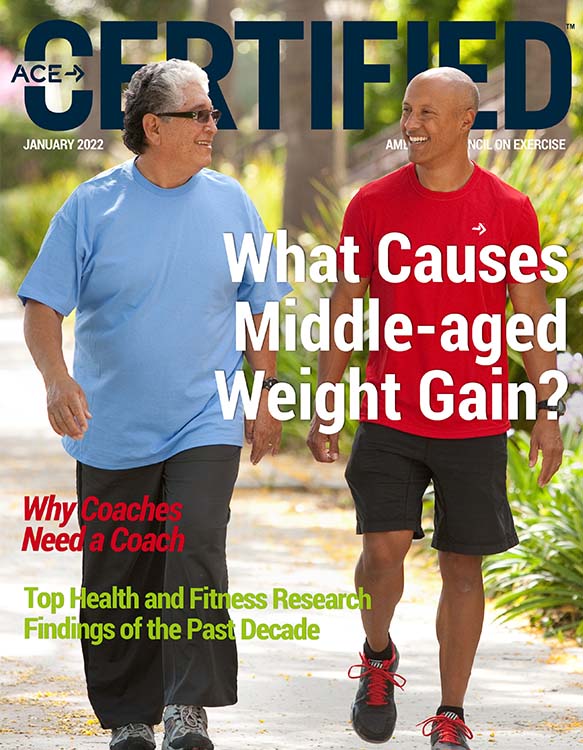
When an individual becomes a certified health coach, they are taking an oath to provide encouragement, support and guidance for their clients. As a health and exercise professional, you are a committed professional whose greater purpose is to be a partner in your clients’ individual voyages of change.
Though clients don’t have an “easy” or straightforward journey, one could argue that the health coach’s journey is no different—it’s nonlinear, it’s challenging and it can feel isolating to new coaches. This struggle became more apparent during the COVID-19 pandemic, which we are still confronting. All helping professions, to varying degrees, experienced some sense of loss, concern and even fear. As a result, we saw a significant rise in mental health concerns and stress.
“The challenges of the COVID pandemic era have highlighted the need to promote mental wellness,” says Suzanne Stringer, MHS, ACE Certified Health Coach and Personal Trainer, Health Sciences adjunct faculty at Anne Arundel Community College, “especially for health coaches who may struggle with burnout when the demands being placed upon us exceed our resources to respond. Just like our clients, we may have an abundance of health information at our disposal but may need help from a coach in executing a wellness plan, as well as in gaining some perspective when it comes to regulating our emotions.”
Experience and years in the field aside, one thing is evident: There is a growing need for health coaches to unite and offer support and guidance to each other in more meaningful and formal ways. A coach needs a coach. This is not to say that a health coach needs another health coach to act within that formal designation (unless specified and requested). It goes beyond that. Coaches coaching coaches (maybe there’s a tagline in there somewhere) means that our original oath to encourage, guide and support clients must be expanded to include our colleagues. This is a call to action to ensure that we are looking out for our own well-being and the well-being of our colleagues working alongside us.
Benefits of Coaches Coaching Coaches
The first benefit is an obvious one: mentorship and growth. Learning, achieving and expanding should not stop simply because formal education or certification concludes. Being mentored can help us develop skills that neither a formal education nor study course can teach. As Stringer notes, it is beneficial to work with a mentor “as we strive to improve our own coaching practice by adopting a growth mindset that allows us to learn from our coach’s feedback and our past experiences. Everyone has the potential to improve through the coaching experience, including health coaches.”
A second benefit to working with a coach is establishing a safe community of support. As professionals, we know our network is invaluable to our practice, not only for a solid referral base but for collaboration and nurturing a feeling of connectedness. Susan Howard, MS, NBC-HWC, AFFA certified Wellness Coach Business Development advisor for obVus Solutions (the developer of minder), relies heavily on the culture of community with her coaching practice and within her organization. “We recognize we all have the ability to learn and grow in a non-judgmental, collaborative partnership. Having a safe place for a coach to feel supported is vital to a coach’s well-being and it offers a platform to share successful practices to offer expansiveness in lifestyle medicine’s positive impact.”
Transcending beyond the obvious benefits of mentorship and community is a sense of new perspective. As health coaches, we often look through that lens—the professional, expert lens—while relying on our motivational interviewing skills and knowledge of behavior change to guide clients as they work to establish new habits (and bid farewell to old ones that no longer serve them). Sometimes, however, we miss out on keeping the client’s perspective at the forefront, which is why there is value in being coached in your coaching role, explains Chris Gagliardi, ACE Scientific Education Content Manager. “Being coached helps you to never lose sight of the client’s perspective, what it feels like to be coached, and the frustrations, challenges and emotions that you feel.”
In short, there’s tremendous value in embracing the coaching process as a client. In doing so, we make ourselves inherently more connected to our clients’ experiences with, and processes of, change. “Being coached can also help us better understand and appreciate the experience of our clients as we learn to treat ourselves with self-compassion and kindness,” adds Stringer.
Related to learning the client’s perspective, working with a coach can help you to create a safe space for processing your clients’ thoughts and feelings (without violating client confidentiality and HIPAA regulations). An outside coach can help you confront your own biases and judgements as well as process your reactions to clients' stories and experiences. Health coaching is a challenging helping profession, and we tend to carry our clients’ troubles and concerns with us. An outside voice can be soothing and reassuring.
Lastly, immersing yourself in the coaching process as a client offers the rare opportunity to observe skill application outside of your own process. When it comes to health coaching, there’s no formulaic approach or step-by-step list of to-dos that helps you facilitate the coaching journey for every client. Instead, you must rely on the concepts, philosophies, tools and strategies inherent to health coaching to cultivate effective coaching experiences. “Being coached is a great way to see how another coach applies their coaching skills in a way that is unique to their coaching style,” explains Gagliardi. “Each health coach has a unique style, approach and philosophical perspective. Observing others in our field doing the same work we do, but in different ways, encourages us to grow beyond what is comfortable and familiar."
Everyone Needs a Coach
When we choose to become a member of the health coaching community, we can easily identify the needs we must satisfy to successfully achieve that goal. We know that education, certification and practical skill application are at the top of the “must do” list, but what we often forget to add is “find a mentor” or “embrace my role as a client.” Too often, many of us assume that, given our quality credentials and experience, we should be expert enough to coach ourselves and mentor ourselves. But it doesn’t work that way, at least not effectively.
As a health coach, you are an expert in the process of change and in the tools necessary to facilitate change, but that doesn’t automatically make you an effective self-coach. “Most people get into the profession of health coaching because they want to help others and sometimes it is easier to help others than to help themselves,” says Gagliardi. “Working with a coach can be an eye-opening experience that can help you to keep some of your time and energy focused on you and your own health. Having a trained outsider (the coach) looking at our lives from the outside in can offer a stark difference from viewing our lives from our own (and sometimes myopic) perspective.”
It might be easier to relate to this on the client level. Clients struggle to see things from an outside perspective and wrestle with identifying barriers to change, even though the answer is right in front of them. They have a greater chance of working through those barriers and addressing their needs when they are coached thoughtfully with integrative approaches. Health coaches aren’t any different. Everyone needs a coach.
So, how do you get out of your own way? The first step is to remind yourself that your job is to coach your clients—not yourself. Second, approach your own coaching experience the same way you encourage your clients to approach theirs—with a growth-focused mindset. Lastly, start the conversation within your own health-coaching community circles and networks by posing these questions:
- How many of you have your own coach?
- What have you learned?
- How has it benefited you personally and professionally?
If you're not yet ready to work with a coach, you might consider utilizing the GROW Model of coaching, which was developed by Sir John Whitmore and is often used in executive coaching. The goal of this model is to help build awareness, responsibility and self-belief, all of which are essential to health coaches. Whitmore views coaching as a way of treating people, a way of thinking and a way of being. He asserts that one day the word
coaching will disappear from our lexicon altogether and it just will become the way we relate to one another. ACE Certified Professionals can access a GROW Model worksheet, which they can use to explore their own goals and create a plan, at the link at the top of this page.
As a health coach, you know that individual journeys of change begin with questions and a thoughtfully guided conversation. The journey of change is further enhanced by the partnership you create with your clients and, now, with members of your professional network of health coaches. We can elevate our coaching practices and our clients’ coaching experiences while embracing personal growth by lifting each other up—not just during this pandemic—but for the foreseeable future of our field. Coaches coaching coaches needs to be part of the work we do.





 by
by 


